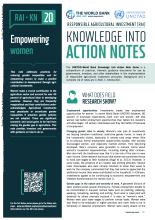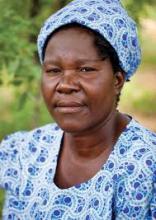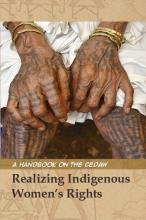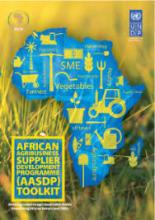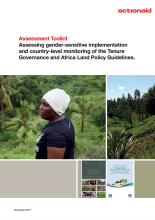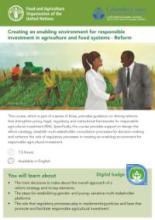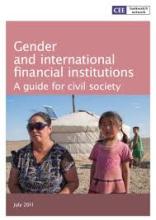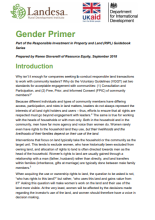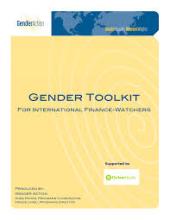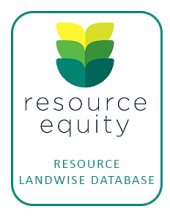Resources for Gender
20 - Empowering Women - Responsible Agricultural Investment (RAI): Knowledge into Action Notes series
This note is part of an Action Notes series and provides guidance for governments and companies on practices to reduce gender inequalities and to empower women to make a positive contribution to development through agricultural investments.
A Guide to Gender Impact Assessment for the Extractive Industries
This guide provides information for companies in the mining, oil and gas sector - and their consultants - on how to undertake a gender impact assessment to gain and maintain a “social licence to operate” with impacted communities and avoid conflict and costly shut-downs. It
• describes some important principles and approaches that should underpin a gender impact assessment,
• provides a framework for companies to identify, understand and respond to the gender impacts of an extractive industry project, and
• outlines some key concepts, definitions and case studies.
A Handbook on the CEDAW: Realizing Indigenous Women's Rights
This handbook is an introduction to the human rights of indigenous women. It provides some detail on the CEDAW as the only instrument specifically for women. It also provides a brief overview of the other available human rights mechanisms.
African Agribusiness Supplier Development Programme (AASDP) Toolkit - Growing inclusive agri-food value chains benefitting African famers and SMEs
This resource provides tools for companies and buyers to improve responsibility and due diligence along the commodity supply chain, building on the Agribusiness Supplier Development Programme (ASDP). It
• provides a brief introduction of the issues,
• provides an in-depth background on the African agricultural economy and the position of smallholders suppliers, SMEs and business in this,
• lays out an overview of the programme’s phases and activities, its governance model, the roles and responsibilities of the various actors within a supply chain, as well as budget and finance, and the setup of a Monitoring and Evaluation (M&E) system, plus an exit strategy,
• provides a range of applied tools and methodologies for implementing the six phases of an ASDP, M&E and impact measurement.
Assessment Toolkit: Assessing gender-sensitive implementation and country-level monitoring of the Tenure Governance and Africa Land Policy Guidelines
This gender-sensitive toolkit enables civil society organisations, women and communities, as well as other actors to assess each country’s current legal framework and tenure governance arrangements in line with the provisions of the VGGTS and the AU F&G.
Creating an enabling environment for responsible investment in agriculture and food systems - Reform
This fact sheet describes the course that provides guidance on driving reforms that strengthen policy, legal, regulatory and institutional frameworks for responsible agricultural investment (RAI). Specifically, the course provides support to design the reform strategy, establish multi-stakeholder consultation processes for decision-making and enhance the role of regulatory processes in creating an enabling environment for responsible agricultural investment.
Gender and international financial institutions. A guide for civil society
The guide consists of an overview of the gender relevant policy framework and initiatives at IFIs. It also contains a gender checklist which should help civil society organisations in determining whether gender considerations have been addressed during the preparation and implementation of IFI-financed projects and programmes. The checklist is divided into three parts:
• broad gender considerations during the project/programme preparation, monitoring and evaluation stages,
• gender issues that need to be addressed during the assessment of projects in particular sectors
• an overview of gender assessment tools, different methodologies and gender sensitive indi- cators.
Gender Primer (Responsible Investment in Property and Land (RIPL) Guidebook Series)
This primer provides guidance for companies who seek to ensure that risks for project-affected communities are minimised, especially for women, who can be more vulnerable than men when it comes to land tenure. It provides step by step requirements to ensure that women as well as men are aware of and benefit from a proposed land transaction. For each step, the primer includes a checklist of questions to help guide the work and a list of resources where more detailed information can be found.
Gender Toolkit for International Finance Watchers
This toolkit aims to give civil society organizations the tools they need to address gender justice issues in their work. The toolkit contains sections on:
- Gender Concepts (terms, frameworks and key debates);
- Gender Action Links (topical briefings and action resources);
- Gender Tools (checklists, indicators and methodologies for gender analysis in specific sectors); and
- Gender Data (links to sex-disaggregated databases).
All sections contain electronic hyperlinks to a vast array of available gender resources.
Gender-Responsive Work on Land and Corruption: A practical guide - Gender-Responsive Work on Land and Corruption
This guide will help organisations understand the differences in impacts of land corruption on men and women, in order to design advocacy programmes that are both inclusive and effective.


